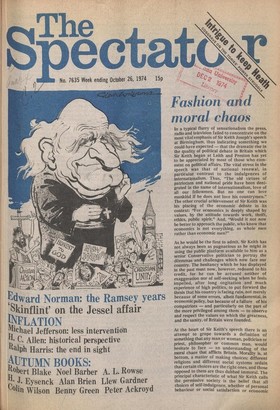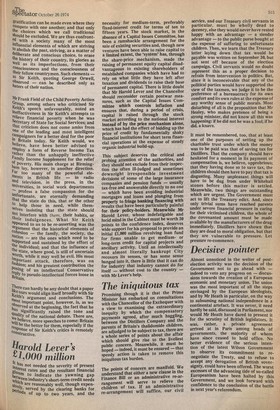In a typical flurry of sensationalism the press, radio and
television failed to concentrate on the most vital emphasis of Sir Keith Joseph's speech at Birmingham, thus indicating something we could have expected — that the dramatic rise in the quality of political debate in Britain which Sir Keith began at Leith and Preston has yet to be appreciated by most of those who comment on political affairs. The vital stress in the speech was that of national renewal, in particular contrast to the indulgences of internationalism. Thus, "The old virtues of patriotism and national pride have been denigrated in the name of internationalism, love of all our fellowmen. But no one can love mankind if he does not love his countrymen." The other crucial achievement of Sir Keith was his placing of the economic debate in its context: "For economics is deeply shaped by values, by the attitude towards work, thrift, ethics, public spirit." And, "Would it not now be better to approach the public, who know that economics is not everything, as whole men rather than economic men?"
As he would be the first to admit, Sir Keith has not always been as pugnacious as he might in using the public platform available to him as a senior Conservative politician to portray the dilemmas and challenges which now face our country. The hesitancy which he has displayed in the past must now, however, redound to his credit, for he can be accused neither of exaggeration nor of self-seeking when he feels impelled, after long cogitation and much experience of high politics, to put forward the thesis that his country is facing ruin, not merely because of some errors, albeit fundamental, in economic policy, but because of a failure of his compatriots — and particularly on the part of the more privileged among them — to observe and respect the values on which the greatness, and the sanity, of Britain were founded.
At the heart of Sir Keith's speech there is an attempt to grope towards a definition of something that any man or woman, politician or priest, philosopher or common man, would hesitate to face — an understanding of the moral chaos that afflicts Britain. Morality is, at bottom, a matter of making choices: different religions and different social systems ordain that certain choices are the right ones, and those opposed to them are thus dubbed immoral. The principal characteristic of what Sir Keith calls the permissive. society is the belief that all choices of self-indulgence, whether of personal behaviour or social satisfaction or economic gratification can be made even where they compete with one another; and that only the choices which we call traditional should be excluded. We are thus confront!I:I with a society many of the most Influential elements of which are striving to abolish the past, striving, as a matter of deliberate and conscious choice, to erase the history of their country, its glories as Well as its imperfections, from their consciousness and the consciousness of their fellow countrymen. Such elements — as Sir Keith, quoting George Orwell, Observed — can be described only as haters of their nation.
Mr Frank Field of the Child Poverty Action Group, among others who criticised Sir .Keith's speech unfavourably, noted an ineffectiveness in Sir Keith's attempts to relieve financial poverty when he was Secretary of State for Social Services; and that criticism does not come amiss from One of the leading and most intelligent e, ampaigners for a better deal for the poor In Britain today. Sir Keith would, we believe, have been better advised to employ a form of Reverse Income Tax r,ather than the unhappily ineffective tarnily Income Supplement for the relief poverty. His main charge at Birmingnatn lay, however, in another direction. Par too many of the powerful elements in British life — in radio and television, in the press, in the universities, in social work departments Profess a false compassion for the unfortunate, are eternally demanding that the state do this, that or the other to help those in need, while themselves insisting that the state should not interfere with them, their habits, or their indulgences. What Sir Keith appeared to us to be re-asserting was the argument that the historical elements of cohesion — the family, the society, the — are the ones which need to be 'uPPorted and sustained by the effort of the individual; and that the influence of the state, where good, is still of uncertain Yvorth, while it may well be evil. His most funPortant attack, therefore, was on ashion; and his greatest contribution the 11.°sing of an intellectual Conservative j3,erpitlayinto. pseudo-intellectual forces loose in There can hardly be any doubt that a paper tke ours would align itself broadly with Sir "nh's argument and conclusions. The 41,0st important point, however, is, as we 'served at the beginning, the fact that he as .significantly raised the tone and culitiaLittY of the national debate. There are, .„nelieve, more speeches to come: Britain 17'" be the better for them, especially if the escionse of Sir Keith's critics is remotely "nstructive.











































